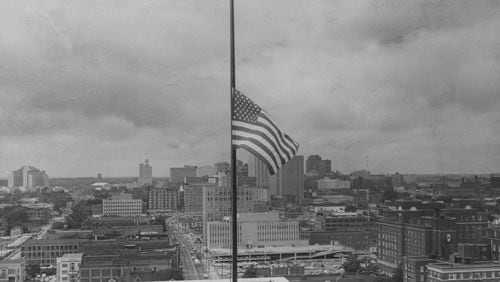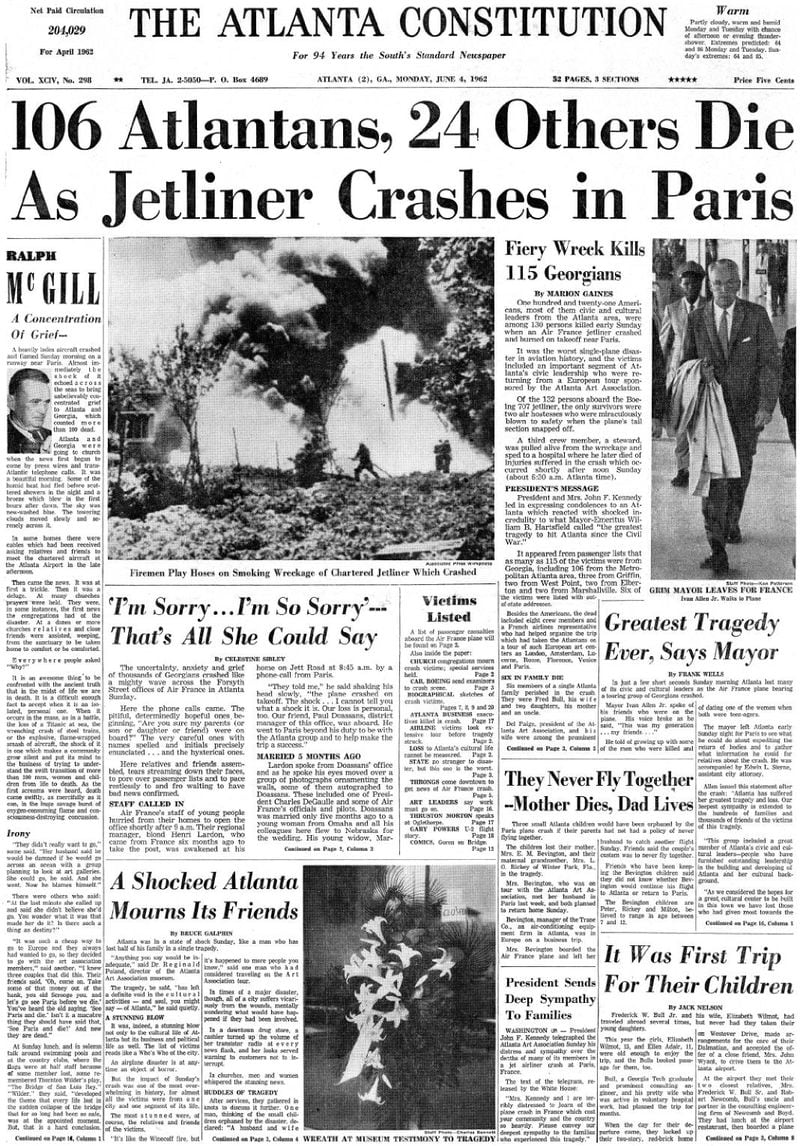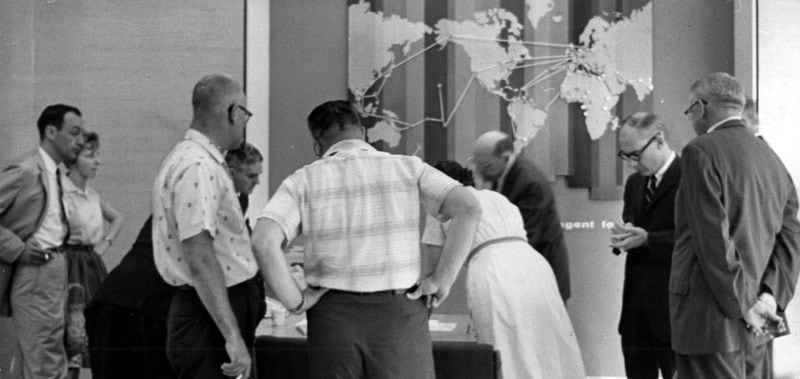Ralph McGill: A Concentration of Grief was originally published June 4, 1962 in The Atlanta Constitution. Ralph McGill was a columnist, editor and publisher of the Constitution.
A heavily laden aircraft crashed and flamed Sunday morning on a runway near Paris. Almost immediately the shock of it echoed across the seas to bring unbelievably concentrated grief to Atlanta and Georgia, which counted more than 100 dead.
Atlanta and Georgia were going to church when the news first began to come by press wires and trans-Atlantic telephone calls. It was a beautiful morning. Some of the humid heat had fled before scattered showers in the night and a breeze which blew in the first hours after the dawn. The sky was new-washed blue. The towering clouds moved slowly and serenely across it.
In some homes there were cables which had been received asking relatives and friends to meet the chartered aircraft at the Atlanta Airport in the late afternoon.
Credit: AJC FILE
Credit: AJC FILE
Then came the news. It was at first a trickle. Then it was a deluge. At many churches prayers were held. They were, in some instances, the first news the congregations had of the disaster. At a dozen or more churches relatives and close friends were assisted, weeping from the sanctuary to be taken home to comfort or be comforted.
Everywhere people asked "Why?"
It is an awesome thing to be confronted with the ancient truth that in the midst of life we are in death. It is difficult enough fact to accept when it is an isolated, personal one. When it occurs in the mass, as in a battle, the loss of a Titanic at sea, the wrenching crash of steel trains or the explosive, flame-wrapped smash of an aircraft, the shock of it is one which makes a community grow silent and put its minds to the business of trying to understand the swift transition of more than 100 men, women and children from life to death. As the first screams were heard, death came swiftly, as mercifully as it can, in the huge savage burst of oxygen-consuming flame and consciousness-destroying concussion.
Irony
"They didn't really want to go," some said. "Her husband said he would be damned if he would go across an ocean with a group planning to look at art galleries. She could go, he said. And she went. Now he blames himself."
There were others who said: "At the last minute she called up and said she didn't believe she'd go. You wonder what it was that made her do it? Is there such a thing as destiny?"
Credit: KEN PATTERSON / AJC FILE
Credit: KEN PATTERSON / AJC FILE
"It was such a cheap way to go to Europe and they always had wanted to go, so they decided to go with the art association members," said another. "I know three couples that did this. Their friends said, 'Oh, come on. Take some of that money out of the bank, you old Scrooge you, and let's go see Paris before we die.' You've heard the old saying, 'See Paris and died.' Isn't it a macabre thing they should have said that, 'See Paris and die?' And now they are dead."
At Sunday lunch, and in solemn talk around swimming pools and at the country clubs, where the flags were at half staff because of some member lost, some remembered Thornton Wilder's play, "The Bridge of San Luis Rey." "Wilder," they said, "developed the theme that every life lost in the sudden collapse of the bridge that for so long had been so safe, was at the appointed moment. But, that is a hard conclusion. It is not an answer. In a play, maybe. But not in this."
It is difficult enough fact to accept when it is an isolated, personal one. When it occurs in the mass, as in a battle, the loss of a Titanic at sea, the wrenching crash of steel trains or the explosive, flame-wrapped smash of an aircraft, the shock of it is one which makes a community grow silent and put its minds to the business of trying to understand the swift transition of more than 100 men, women and children from life to death.
Grief
It was a busy day for priests and ministers.
All Sunday afternoon they went about Atlanta visiting homes where grief was. There was not one who did not encounter the sobbing question, “Why? Why? Why?"
The answer of one can be told. A rector put his arms about a sobbing woman. "In the inscrutable mystery of life and death," he said gently, "there is no glib answer. There is faith or there isn't. Faith is an assuagement of grief, though not of your sorrow. With faith one can accept the finality of death. We are created, we live, we die, we live again. In my Father's house are many mansions. If it were not so I would have told you."
RELATED: Read about the life and columns of Ralph McGill








